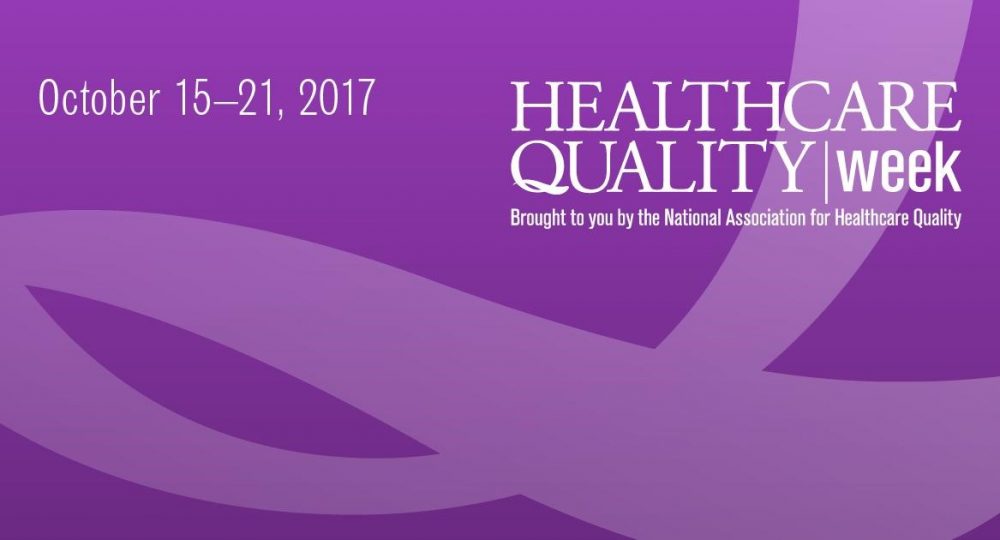The Healthcare Quality Professionals at Registry Partners proudly join the National Association for Healthcare Quality (NAHQ) and those around the country in celebrating Healthcare Quality Week, October 15-21, 2017
The week brings greater recognition for the healthcare quality profession and the contributions and impact these professionals make in their organization.
See how our staff answers the questions: To me, Healthcare Quality means….
- Having confidence in the care my family and I are given and the care I provide. It means that I know that the care given has been shown to be the best course of action based on research, data, and experience. It means that I can trust the plan of care that I receive and provide. – Jen Carter
- Doing the right thing all the time. It means taking care of our patients like they are our family members and doing the right thing every time no matter what department you are in because it takes every department to make up a quality facility. – Eva Pierce
- Safe, patient centered care that offers equal treatment for all patients while maintaining continual improvement in all aspects of care that is driven by evidence based research and quality data analysis. – Gloria Arnold
- Whether at bedside or in the office, working as a team to continually improve our accuracy and efficiency to promote positive patient outcomes – Pam Marshall
- Applying evidence based practice guidelines to care for every pediatric patient thereby improving hospital and post hospital outcomes and experiences for every patient and family. – Becky White
- When I think of healthcare quality, I think of the standards we hold ourselves to within our company. We are a part of something big and it is crucial we view everything we do that way. I believe it is the efficiency, timeliness, and level of effort we put forth in our work to give the client the best possible product we can. That is what good quality means. In healthcare, regardless of the role, it is the degree excellence in care they are receiving. We are a small part in advancements of patient care, but the quality we deliver matters significantly. – Samantha Kuecher
- Healthcare Quality is providing the evidence based standard care or above standard care to the patients based on data collected and analyzed against other healthcare systems. – Stacy Gehm
- Means healthcare that is cloaked in safety and is provided by a skilled team of professionals that are adhering to evidence-based practice endorsed by the appropriate governing bodies to achieve goals that are patient-focused and patient-driven. For me, it cannot be considered quality if any one of these elements is omitted or compromised. – Lynn Nobles
- Always doing the very best we can for our patients no matter what role we hold in healthcare. We are all part of a team that strives to improve patient care and patient outcomes. For us, at RPI, it is about collecting data but remember data becomes information and information becomes knowledge and knowledge becomes wisdom. This wisdom allows us all to grow and to improve and to strive for quality patient care for everyone, including ourselves. – Tracy Deck
- Follow Up. Providing excellent patient care by focusing on seamless “provider to patient/provider to provider” communication throughout the patient experience and beyond. The acute care phase and subsequent follow up plan should be modeled in response to evidence based/widely recommended best practice, and it should be viewed as a continuous process to ensure the most positive patient outcome. Ongoing communication, or lack thereof, has the potential to have a significant impact, positive or negative, when care is being “shared” among multiple providers- whether they are facility Nurses, MD’s, Consultants, ancillary services, and/or outside entities. For me, the information that is passed on prior to patient arrival (if at all possible) through discharge from the acute care setting should speak volumes about what had transpired thus far, and what should happen once the patient is discharged. Development and revision of standard communication “formats” along with clear processes for communicating the patient plan to all involved (including the patient) are paramount to minimizing health related patient “setbacks”, avoiding unplanned readmissions, and maximizing the patient’s understanding/ adherence to regimens that will enhance quality of life. – Sue VonBosse
- The most appropriate, safe and equitable possible care for all populations. – Leoma Berroteran





